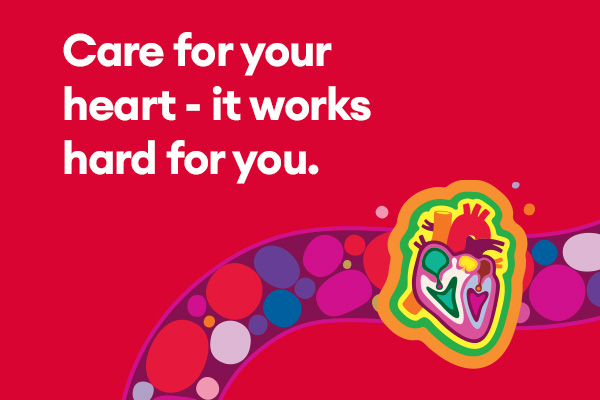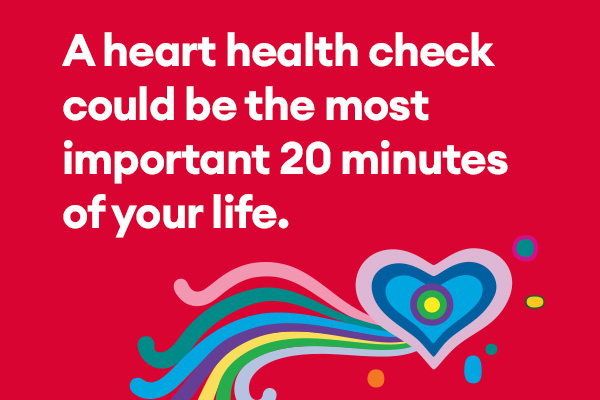Written by Medibank
January 2024
When you think of ‘men’s diseases’, prostate or testicular cancer probably come to mind, yet it’s actually heart disease that kills more men in Australia each year than any other illness.
Men not only have a higher chance of getting certain heart diseases, but they are also more likely to develop heart problems when they are middle-aged. As they get older, this risk keeps increasing. One reason why men are more at risk of heart disease earlier in life may be because they aren’t protected by oestrogen, a hormone that has a beneficial effect on the cardiovascular system.
Fortunately, there are some simple things that can be done to address many of the risk factors for heart disease and improve heart health.

What is heart disease?
Cardiovascular disease – often just called heart disease – is an umbrella term that includes a number of different diseases and heart conditions.
The most common and serious types of cardiovascular disease affect the blood vessels of the heart or the brain, causing them to become narrow or even blocked. If this blockage stops the blood flow it can cause a heart attack or a stroke.
What are the symptoms of heart attack in men?
Chest discomfort or pain is the most common heart attack symptom for men. It might feel like an ache, squeezing, pressure or a feeling of fullness. It may also spread to other parts of the body, including the arms, neck, jaw or back.
For some people, this discomfort or pain is severe but for others it’s mild. And it may last for several minutes at a time or come and go in waves.
For men, this pain or discomfort may also be accompanied by:
- nausea
- a shortness of breath.
However, no 2 heart attacks are exactly the same. Warning signs vary and some people won’t experience any chest pain.
It’s also possible to have what’s called a ‘silent heart attack’, which doesn’t cause any symptoms.
If you do experience warning signs of a heart attack that are severe, become worse or last for longer than 10 minutes, treat it as a medical emergency and call an ambulance.

24/7 Medibank Nurse Support
Medibank health insurance members can speak to a registered nurse at no extra cost.1 Chat over the phone or online, any time of the day or night.
1 Some referred services may involve out of pocket costs and waiting periods may apply.
5 risk factors for heart disease in men
Four in 5 men in Australia are living with at least one modifiable heart-disease risk factor.1
The more risk factors you have, the more likely you are to develop heart disease, but most cardiovascular disease risk factors are modifiable or preventable.
These are called lifestyle risk factors and they include the following:
1. Unhealthy weight
Seventy-five per cent of men in Australia are overweight or living with obesity.2 This raises the risk of developing other health conditions, including high blood pressure, high cholesterol, and diabetes, which increase the risk of heart disease. For example, people living with diabetes are up to 4 times more likely to have a heart attack or stroke, while high blood pressure – which is more common in men than women – remains the top risk factor for stroke.
Calculating your waist-to-height ratio is one way to monitor whether your weight poses a health risk. To find your ratio, divide your waist measurement by your height (in centimetres). A waist-to-height ratio of greater than 0.5 is associated with a higher risk of cardiovascular disease. You can also use a BMI calculator as an additional tool to assess your weight and set some weight-loss goals if you need to.
2. Unhealthy diet
The food you eat directly impacts your weight as well as your cholesterol levels and blood pressure. For example, consuming too much saturated fat increases levels of LDL, or ‘bad’ cholesterol, while a diet high in salt may increase the risk of high blood pressure. On the other hand, eating at least 5 serves of vegetables a day – something fewer than one in 20 men in Australia do – can lower the risk of heart disease.
A heart-healthy diet is rich in fibre, antioxidants and healthy fats, and low in salt, added sugar and unhealthy fats. To achieve this, eat plenty of vegetables and fruits, wholegrain cereals and breads, and nuts and seeds. Choose healthy sources of protein, like fish, lean cuts of meat and legumes, and use olive oil for cooking. And instead of salt, use herbs and spices to add flavour.
3. Being inactive
Seventy-three per cent of men in Australia don’t do enough physical and muscle-strengthening activity.3 This can increase the risk of developing heart disease as well as high blood pressure and high cholesterol.
Aim to do at least 2½ hours of moderate intensity or 1¼ hours of vigorous intensity physical activity each week, and include muscle-strengthening activities at least 2 days a week. Try to do something active most days of the week. Even better if you can do something active every day.
4. Smoking
By damaging the blood vessels that supply blood to the heart and brain, smokers are 3 times more likely to die of a heart attack and 2 times more likely to die of stroke.4
In Australia, smoking rates are highest amongst males, with one in 6 men being smokers. If you need help to quit, contact Quitline on 137 848.
5. Too much alcohol
Over time, as well as weakening the heart, heavy drinking can cause the level of some blood fats to rise and can increase blood pressure, too. As a result, people who drink heavily are 3 times more likely to have a stroke.5
While a quarter of adults in Australia drink too much alcohol, it’s men who are significantly more likely to fall into this category. There’s no ‘safe’ level of drinking as far as your health is concerned, but the less you drink, the lower the risk of harm. Try not to drink more than 4 standard drinks on any single day, and no more than 10 in total, a week.
There are also some heart-disease risk factors that you can’t control, such as your age and if you have a family history of heart disease. While growing older is associated with an increased risk of heart disease, you may also be at a higher risk if you have a close family member, such as a parent or a sibling, who’s had a heart attack or stroke before they turned 60.
Prevention of heart disease also involves catching any risk factors, both those that you can and can’t change, as early as possible. For this reason, regular Heart Health Checks are recommended to men aged 45 years and over, or 30 years and over for Aboriginal and Torres Strait Islander peoples.

Health programs
Eligible Medibank members can access a range of programs and research trials designed to manage their health conditions and provide access to more affordable care options.
Read more about heart healthy living
Looking for something else?
Visit Heart health for more information.
Things you need to know
* Heart Foundation; Key Statistics: Cardiovascular Disease; retrieved June 2023
1 Australian Institute of Health and Welfare; Risk factors; retrieved June 2023
2 Australian Institute of Health and Welfare; Overweight and obesity; retrieved June 2023
3 AIHW; Physical activity; retrieved July 2023
4 Heart Foundation; Are you at risk of heart disease?; retrieved June 2023
5 Heart Research Institute; Stroke: symptoms, causes and prevention; retrieved June 2023
While we hope you find this information helpful, please note that it is general in nature. It is not health advice, and is not tailored to meet your individual health needs. You should always consult a trusted health professional before making decisions about your health care. While we have prepared the information carefully, we can’t guarantee that it is accurate, complete or up-to-date. And while we may mention goods or services provided by others, we aren’t specifically endorsing them and can’t accept responsibility for them. For these reasons we are unable to accept responsibility for any loss that may be sustained from acting on this information (subject to applicable consumer guarantees).










